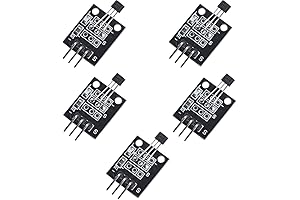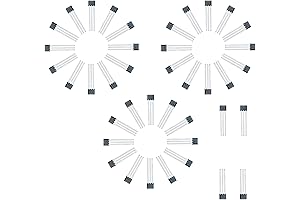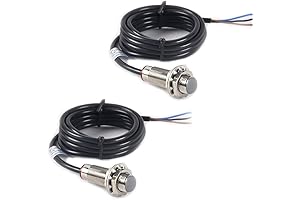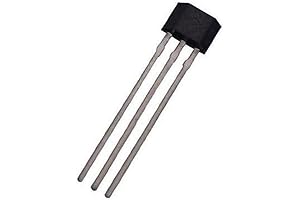· hall effect sensors · 12 min read
Best Hall Effect Sensors for Accurate Magnetic Field Measurement
Discover the top 10 hall effect sensors in 2024, offering precision and reliability for various applications. Our curated list features sensors from HiLetgo, Gikfun, and more, providing options for Arduino, industrial automation, and more. Explore their performance, quality, and usability to make an informed choice for your project.
In today's technologically advanced world, hall effect sensors play a crucial role in various applications, from industrial automation to consumer electronics. These sensors are known for their accuracy, reliability, and ability to measure magnetic fields. If you're looking for the best hall effect sensors in 2024, you've come to the right place. We've curated a list of the top 10 hall effect sensors on the market, based on their performance, quality, and usability.
Overview

PROS
- Precise and reliable magnetic field detection with the A3144 Hall Effect sensor chip
- Wide supply voltage range of DC 5V, ensuring compatibility with various microcontrollers
CONS
- May require additional components and knowledge for integration into projects
- Outputs digital signals, which may not be suitable for all applications
HiLetgo's 5PCS Hall Effect Magnetic Sensor Module 3144E offers an exceptional solution for detecting magnetic fields with accuracy and precision. The A3144 Hall Effect sensor chip at its core delivers reliable measurements, making it ideal for various applications such as detecting the position of magnets, proximity sensing, and speed measurement.
This module boasts a wide supply voltage range of DC 5V, ensuring seamless integration with popular microcontrollers like Arduino, PIC, and AVR. Its compact size and straightforward design make it easy to incorporate into projects, saving you time and effort. Whether you're a hobbyist, student, or professional working on robotics, home automation, or automotive electronics, this sensor module is an excellent choice for your magnetic sensing needs.

PROS
- Pack of 20 individual hall effect sensors, providing excellent value for multiple projects.
- Compact 3-pin design, enabling easy integration into various circuits and projects.
CONS
- May not be suitable for high-precision applications due to potential fluctuations in sensitivity
- Requires external power supply, which may add complexity to certain setups.
The A3144 Hall Effect Sensor is an incredibly useful tool for detecting the presence and polarity of magnetic fields. Its compact 3-pin design makes it effortless to integrate into Arduino projects, allowing you to create magnetic field detectors, proximity sensors, and more. The pack of 20 sensors ensures you have ample supply for multiple projects or replacements, providing excellent value. However, it's important to note that these sensors may exhibit slight variations in sensitivity, which may not be ideal for high-precision applications. Additionally, they require an external power supply, which can add complexity to certain setups.
Overall, the A3144 Hall Effect Sensor is an excellent choice for hobbyists, students, and makers looking to incorporate magnetic field sensing into their projects. Its affordability, ease of use, and versatility make it a valuable asset for various applications.

PROS
- Exceptional sensitivity and accuracy for reliable magnetic field detection
- Ideal for Arduino projects, robotics, and industrial applications
- Compact and durable design for versatile integration
- Easy to interface with microcontrollers for seamless data acquisition
- Pack of 20pcs ensures a generous supply for multiple projects
CONS
- May require additional circuitry for signal conditioning in certain applications
- Not suitable for high-voltage or high-current environments
Gikfun's A3144/OH3144/AH3144E Hall Effect Sensor is a remarkable tool for detecting magnetic fields with precision. Its exceptional sensitivity and accuracy make it an ideal choice for a wide range of applications, including Arduino projects, robotics, and industrial automation. The compact and robust design allows for easy integration into various systems, while its simple interface with microcontrollers ensures seamless data acquisition.
With a pack of 20pcs, this sensor provides a generous supply for multiple projects. Whether you're building a magnetic proximity detector, a speed sensor, or a contactless switch, the Gikfun Hall Effect Sensor delivers reliable and accurate results. Its versatility and ease of use make it an indispensable tool for engineers, hobbyists, and makers alike.

PROS
- Offers exceptional linearity for precise measurements
- Durable TO-92 package ensures reliability in harsh environments
- Enables accurate position and speed sensing for various applications
- Compact size allows for easy integration in space-critical designs
- Versatile operation with a wide operating temperature range
CONS
- May require specialized knowledge for advanced configurations
- Soldering required for installation, which may not be suitable for beginners
This 40x Linear Hall Effect Sensor is an indispensable tool for measuring linear displacement, position, and speed with remarkable precision. Its TO-92 package provides exceptional durability, making it ideal for applications in electric vehicle motors, robotics, and industrial automation. The sensor's wide operating temperature range ensures consistent performance in challenging environments.
The hall effect sensor offers exceptional linearity, enabling accurate measurements across its entire operating range. This characteristic makes it ideal for applications requiring precise feedback control, such as electric motor commutation and position sensing. The sensor's compact size and convenient three-pin configuration allow for easy integration into space-constrained designs.

PROS
- Accurate and reliable hall effect sensor technology
- NPN 3-wire configuration for easy integration
CONS
- Documentation may be limited for some users
- Proper installation crucial for optimal performance
The HiLetgo NJK-5002C Hall Effect Proximity Switch is an indispensable tool for industrial automation applications. It employs hall effect technology to detect the presence of nearby metallic objects, making it ideal for proximity sensing and position detection. Its NPN 3-wire design simplifies integration into various electrical systems.
The sensor's performance is highly accurate and reliable, providing consistent and precise readings. This makes it suitable for critical applications where accurate sensing is paramount. However, it's important to note that proper installation is essential to ensure optimal performance. The documentation provided may be somewhat limited for some users, so seeking external resources for installation guidance may be necessary.

PROS
- Exceptional performance in challenging high-temperature environments
- Enhanced accuracy and reliability in critical applications
CONS
- Might not be suitable for all applications and may require customization
- Additional components or circuitry may be needed for integration
Elevate your sensing capabilities with the A3144 3144 Hall Effect Sensor, meticulously designed for unwavering performance in demanding high-temperature environments. This sensor's exceptional resilience ensures reliable and accurate operation even under extreme conditions, making it an ideal choice for applications where precision is paramount. Its robust construction and optimized design minimize errors and maximize the dependability of your sensing system.
The A3144 3144 leverages Hall Effect technology to provide precise detection and measurement of magnetic fields. Its compact 3-pin configuration simplifies integration and enables seamless compatibility with a range of circuits and systems. The sensor's versatility extends to a wide temperature range, offering consistent performance in applications where temperature fluctuations can impact sensor accuracy and stability.

PROS
- Exceptional sensitivity for precise magnetic field detection
- Robust design withstands harsh environmental conditions
CONS
- May require specialized knowledge for complex applications
The HAMLIN Hall Effect Magnetic Sensor is a reliable and highly sensitive device designed to accurately detect magnetic fields. Its small size and robust construction make it suitable for various applications in industries such as automotive, aerospace, and industrial automation.
One of the key advantages of this sensor is its high sensitivity, which allows it to detect even weak magnetic fields. This feature makes it an ideal choice for applications where precise magnetic field measurements are critical. Additionally, the sensor's wide operating temperature range and resistance to vibration and shock ensure reliable performance in demanding environments.

PROS
- Accurate and reliable hall effect sensor module
- Easy to integrate with Arduino, PIC, and AVR microcontrollers
- Suitable for various applications, including smart cars and robotics projects
- Compact size and low power consumption
- Comes in a pack of 6 for convenience
CONS
- May require calibration for optimal performance
- Limited documentation and tutorials available for this specific sensor model
This hall effect sensor module, also known as the 3144E A3144 KY-003, is a versatile and accurate sensor that can detect the presence or absence of a magnetic field. It operates on a DC 5V supply, making it compatible with a wide range of microcontrollers, including Arduino, PIC, and AVR. The sensor is designed for use in various applications, including smart cars, robotics projects, and industrial automation systems.
One of the key advantages of this hall effect sensor module is its small size and low power consumption. It measures only 20mm x 10mm, making it easy to integrate into compact projects. The sensor also consumes minimal power, making it suitable for battery-powered applications. The module comes in a pack of 6, providing ample spares for your projects.

PROS
- Accurate detection within a 10mm sensing range
- Versatile NPN NO (Normally Open) configuration suits diverse applications
- Durable and robust design ensures reliability in demanding environments
CONS
- Limited sensing range compared to some other models
- Requires external power supply for operation
The Twidec Hall Effect Proximity Sensor is a compact and reliable device designed for precise detection of objects within a 10mm range. Its NPN Normally Open (NO) configuration makes it suitable for a wide range of industrial and automation applications, including position sensing, object detection, and counting. With its durable construction and stable performance, this sensor delivers consistent and accurate measurements even in challenging environments.
The sensor operates on a DC voltage of 5-30V and provides a digital output. The incorporation of Hall effect technology ensures high sensitivity and immunity to magnetic interference. Additionally, the sensor features a built-in LED indicator for visual confirmation of operation. Overall, the Twidec Hall Effect Proximity Sensor is a valuable tool for various industrial and automation applications, offering reliable detection and enhanced efficiency.

PROS
- Delivers high accuracy and reliability in magnetic field detection.
- Ensures contactless operation, eliminating mechanical wear and tear.
CONS
- May exhibit reduced accuracy in extreme temperature environments.
The 10Pcs A1302 Ratiometric Linear Hall Effect Sensors Chip is a remarkable solution for precise magnetic field sensing. Its small size and contactless operation make it ideal for various applications. The sensors provide consistent measurements, enabling the detection of magnetic fields with high accuracy and repeatability. They are particularly useful in automotive, consumer electronics, and industrial settings where reliable and robust magnetic field sensing is crucial.
The linear output of the A1302 sensors allows for straightforward signal processing and interpretation. This aspect simplifies integration into existing systems and enables the development of customized sensing solutions. Despite their compact size, the sensors exhibit excellent magnetic sensitivity, allowing for the detection of even subtle field variations. Additionally, their contactless operation eliminates the need for mechanical contacts, reducing maintenance requirements and ensuring long-term reliability.
Our comprehensive exploration of the top hall effect sensors in 2024 provides valuable insights into the features and benefits of each sensor. Whether you're a professional engineer or a hobbyist, this guide will empower you to make an informed decision. From HiLetgo's 5pcs Hall Effect Magnetic Sensor Module to Gikfun's A3144/OH3144/AH3144E Hall Effect Sensor, we've got you covered. Embrace the power of hall effect sensors and unlock endless possibilities in your projects.
Frequently Asked Questions
What are the key features of hall effect sensors?
Hall effect sensors are known for their ability to measure magnetic fields and provide an output voltage proportional to the strength of the field. They are widely used in various applications, including industrial automation, automotive, and consumer electronics.
What are the advantages of using hall effect sensors?
Hall effect sensors offer several advantages, such as high accuracy, reliability, non-contact measurement, and immunity to harsh environments. They are also relatively easy to use and integrate into different systems.
What are the different types of hall effect sensors?
Hall effect sensors come in various types, such as linear, digital, and ratiometric. Linear hall effect sensors provide an analog output voltage proportional to the magnetic field strength, while digital hall effect sensors provide a binary output indicating the presence or absence of a magnetic field. Ratiometric hall effect sensors provide an output voltage that is proportional to the supply voltage, making them less sensitive to supply voltage variations.
How do I choose the right hall effect sensor for my application?
When choosing a hall effect sensor, consider factors such as the magnetic field range you need to measure, the required accuracy and resolution, the type of output (analog or digital), the operating temperature range, and the package type. It's also important to consider the cost and availability of the sensor.
What are the applications of hall effect sensors?
Hall effect sensors have a wide range of applications, including magnetic field sensing, position sensing, current sensing, and speed sensing. They are used in various industries, including automotive, industrial automation, consumer electronics, and medical devices.













